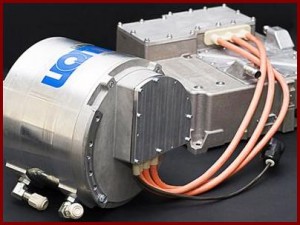
UQM said in 2009 that it would produce 20,000 of its EV propulsion systems over a two-year span for CODA. It never happened.
The U.S. Department of Energy has granted a two-year extension of its taxpayer-funded grant to UQM Technologies. UQM (NYSE Amex: UQM), a developer of electric motors for electric and hybrid vehicles, has so far qualified for funding by this grant of $16.9 million, but is unable to fulfill the promises of jobs and mass production under the original grant timetable. UQM’s period of performance for the program has now been extended from 3 years to 5 years with a new completion date of 12 January 2015.
In addition to this grant from the American Recovery and Reinvestment Act, UQM also has a $4 million program for the development of non-rare-earth magnet electric motors for use in electric and hybrid electric vehicles, with $3 million of the program funding provided by the DOE.
The politically contentious American Recovery and Reinvestment Act contained billions upon billions in taxpayer funding to businesses through a number of Recovery Act and related programs that include loans, loan guarantees, grants, contracts and tax incentives, in a DOE partnership with the Department of Treasury. Some of the companies have since gone bankrupt, and DOE – after Congressional criticism – appears to have tightened its scrutiny of applicants and how it will pass out more taxpayer money going forward.
In total, CBO estimates that the legislation will increase budget deficits by about $831 billion over the 2009–2019 period. By CBO’s estimate, close to half of that impact already occurred in fiscal year 2010, and more than 90% of ARRA’s negative budgetary effect was realized by the end of December 2011.
Nevertheless, CBO estimates that, compared with what would have occurred otherwise, in 2012 ARRA alone will:
- Raise real GDP by between 0.1% and 0.8%
- Increase the number of FTE (full time equivalent) jobs by between 0.2 million and 1.3 million.
(The automotive sector – including Ford and Nissan, which were granted more than $7 billion in loans – wasn’t the only benefactor of this complex act. Proponents argue the economic support through the Recovery Act provided an important countercyclical buffer along with the automatic stabilizers that kicked in with a weakening U.S. economy. For example, in fiscal year 2011state and local governments faced a record budget gap of $191 billion, or 30% of state budgets – the largest nominal and percentage gaps on record. The use of Recovery Act funds reduced the shortfall by a third, to $123 billion, preserving countless state and local government jobs.)
UQM’s latest financial results for its Q3 ending last 31 December show that the company lost $846,416 or $0.03 per common share on total revenue of $2,719,323 versus a net loss of $932,520 or $0.03 per common share on total revenue of $2,090,474 for the third quarter the 2010 fiscal year.
UQM results for the nine-month period ending 31 December 2011 resulted in a net loss of $3,476,144 or $0.10 per common share on total revenue of $6,368,606 versus a net loss of $1,797,183 or $0.05 per common share on total revenue of $6,673,356 for the comparable period last year. Therefore, losses are growing.
“This Grant has been instrumental in assisting us to introduce an automotive qualified electric propulsion system for the CODA all-electric vehicle, which recently went on sale in the State of California, and for our other customers who are planning for potential future clean vehicle introductions,” said Eric Ridenour, UQM Technologies President and Chief Executive Officer.
In 2009, UQM signed a 10-year contract to build motor and control systems for all electric cars to be manufactured by CODA Automotive of California. UQM at the time said it would produce 20,000 of its EV propulsion systems over a two-year span. It never happened.
Coda just sold its first three EVs last month in California. The 31kWh 2012 CODA has an MSRP of $37,250, and a claimed maximum range of up to 125 miles on a single charge. In California, federal and individual state tax saving and credits can bring the price down to $27,250, courtesy of even more taxpayer subsidies.
To accommodate the increase in production that was promised by the CODA deal, UQM purchased a 129,000 sq. foot building, four times the size of its original facility using money from its American Recovery and Reinvestment Act grant through the Department of Energy’s Vehicles Technologies Program to pay for part of the $7.5 million facility in Longmont, Colorado.
The propulsion systems UQM developed for Coda cars are compact, 11 inches in diameter, 10 inches long and weighing 11 pounds. Despite their small size, the units are powerful, generating a peak of 100 kilowatts (134 horsepower) of energy.
UQM was formed in 1967, and originally built fiberglass parts for planes and kit automobiles. In the late 1970s, UQM switched to manufacturing Electrek—an electric car. Following Electrek’s development, the company invented a core permanent magnet motor. UQM has created extensions of the technology ever since and receiving government assistance ever since.

